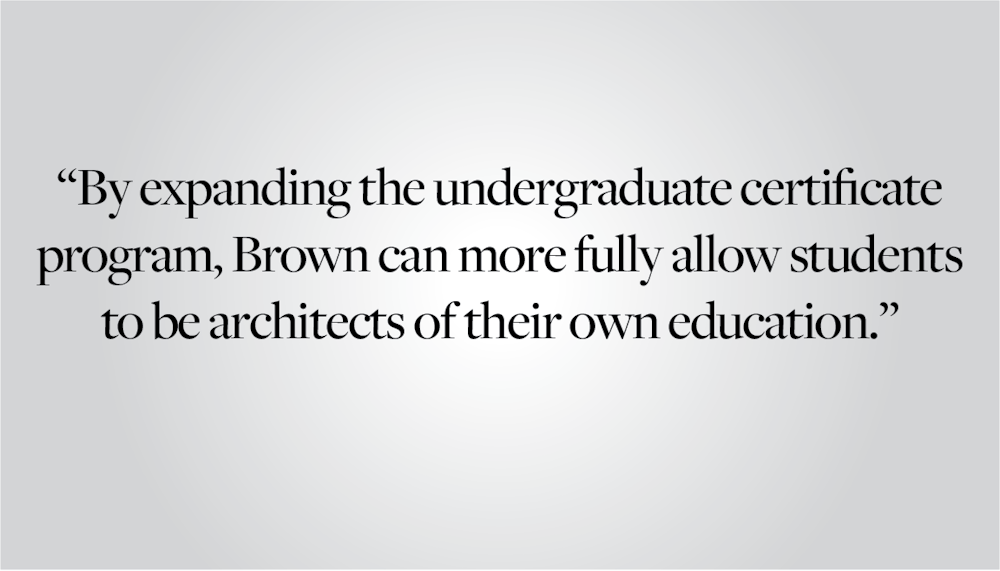This semester, the Brown Renewable Energy and Sustainability Society has been advocating for a certificate in sustainability to join similar programs in data fluency, engaged scholarship, entrepreneurship, intercultural competence and migration studies. We’re all for a sustainability certificate — but why stop there? The University should proactively introduce more undergraduate certificates and allow students more flexibility in adding certificates to their existing course plans.
The certificate system — introduced in 2019 — was designed to “enable degree-seeking students to pursue an integrated combination of coursework, co-curricular and experiential learning,” but its current structure fails to fully live up to that goal. Certificates, which typically require the completion of four or five courses, can easily be combined with a concentration in the pursuit of an interdisciplinary education. But certificate offerings are limited and declaring them is needlessly restricted.
For example, many students may be interested in foreign languages, but lack the space in their four-year plans or the interest in high-level literary analysis often required to complete a concentration like East Asian Studies or German Studies. Certificates in languages could fix this problem. A language certificate could require completing the central language sequence of a department or placing out of the language sequence and taking four to five courses in the department. These foreign language certificates would provide Brown students the opportunity to gain concrete communication skills in new languages, allow students to explore more of their interests and produce additional material for their resumes — setting them up for success in the future.
While Brown’s intercultural competence certificate, hosted by the Center for Language Studies, allows students to focus on a language, it also requires students to complete either an internship or a study abroad experience relevant to the language of study. This experiential learning requirement, while beneficial to an understanding of global cultures, dissuades many students from pursuing the certificate.
Certificates could also allow students to better incorporate into their education subjects that Brown does not offer as full concentrations. While the current certificate programs largely focus on providing students with specific skills, they still do not offer pathways in many popular and useful fields. Programs in journalism, criminal justice, marketing, accounting and communications are common offerings at other institutions. But without concentrations in these subjects at Brown, interested students must settle for concentrations that don’t entirely match their desired area of study. Certificate programs in these fields — supported by faculty whose various areas of study intersect with them — would allow these students to dive into their interests in a tangible way.
Some improvements to Brown’s certificate program are even simpler. Currently, students pursuing a double concentration cannot declare a certificate as “these students already pursue the integrative and interdisciplinary work that undergraduate certificates support.” But the University does not set a limit on the number of concentrations students are able to pursue, and students occasionally and successfully choose to pursue triple concentrations in their interdisciplinary exploration. The same should be the case for certificates. If a student wants to add a certificate to a double concentration, they should be allowed to and their efforts should be recognized.
Ultimately, the scarcity of certificate programs, along with the restrictions placed on their accessibility, undersells what students have learned in their time at Brown. The University states that under the Open Curriculum “as the architect of their own education, Brown students are responsible for their own intellectual and creative development.” But the limited subjects and gatekeeping of certificate programs ignore that principle. By expanding the undergraduate certificate program, Brown can more fully allow students to be architects of their own education.
Editorials are written by The Herald’s editorial page board and aim to contribute informed opinions to campus debates while remaining mindful of the group’s past stances. The editorial page board and its views are separate from The Herald’s newsroom and the 133rd Editorial Board, which leads the paper. This editorial was written by the editorial page board’s editor Kate Waisel ’24 and members Irene Chou ’23, Yasmeen Gaber ’23, Tom Li ’26, Jackson McGough ’23, Alissa Simon ’25 and Yael Wellisch ’26.





